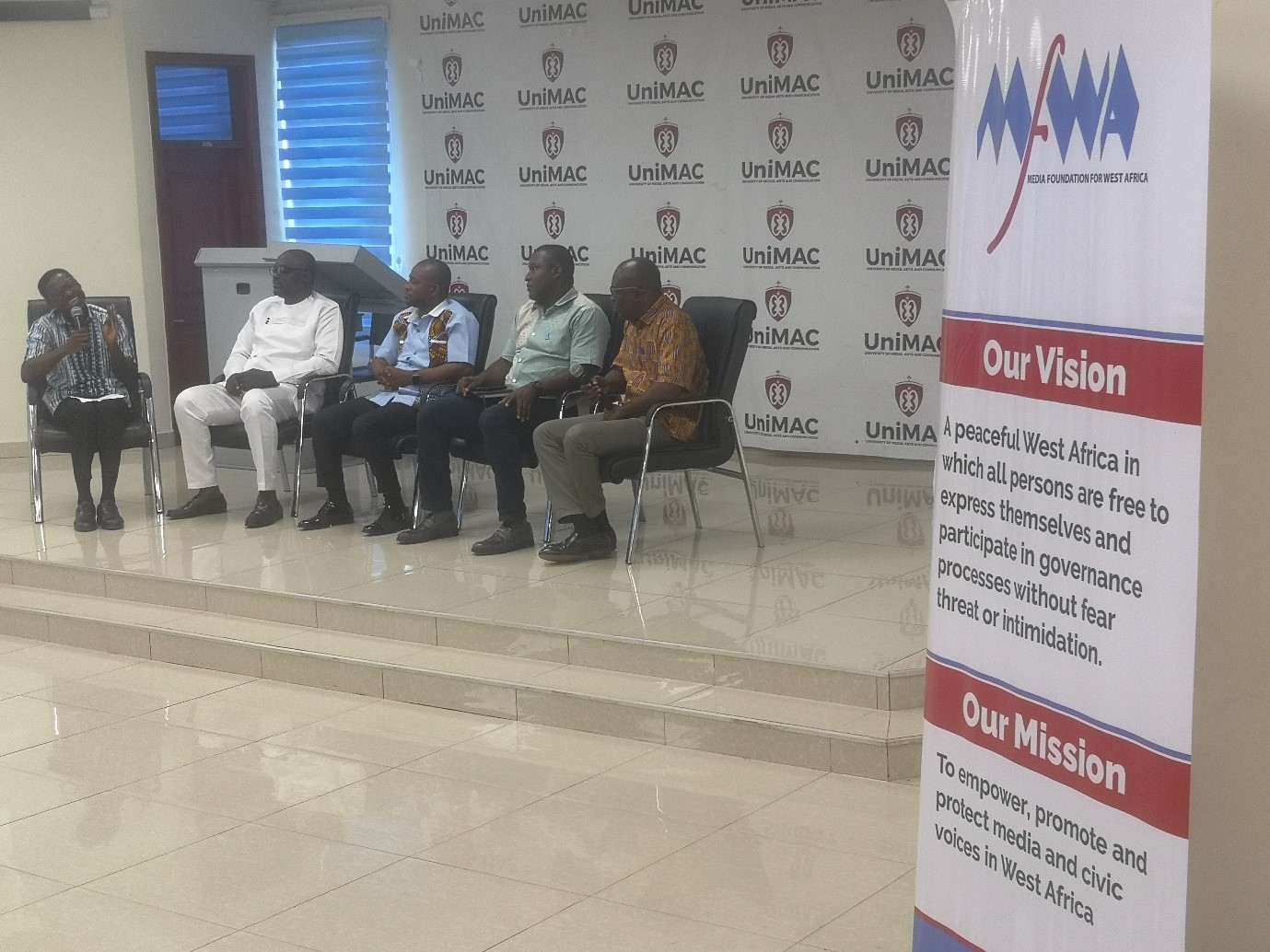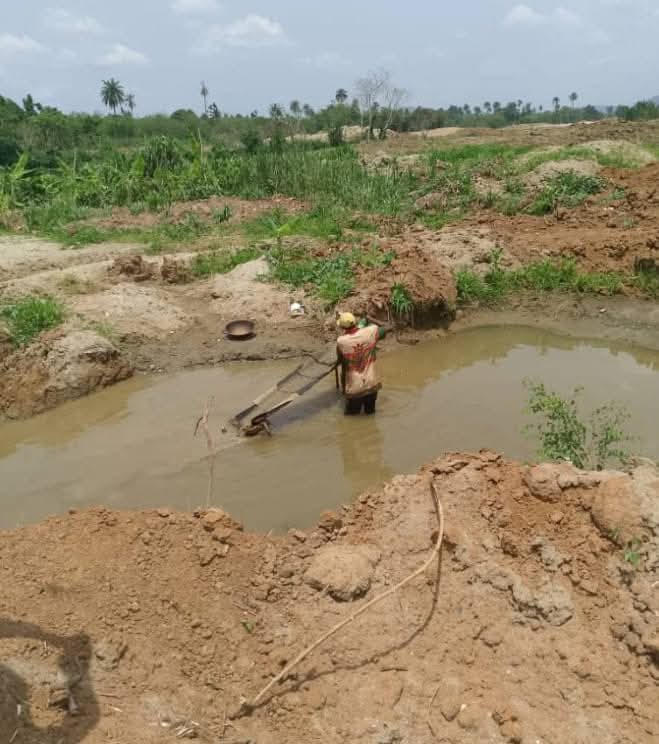The Media Foundation for West Africa (MFWA), in collaboration with the pro-environment civil society organisation A Rocha Ghana, University of Media Arts and Communications (UniMAC)-Institute of Journalism and the Ghana Journalists Association organised a seminar in Accra on June 5, 2025, to commemorate World Environment Day.
The event took place at the University of Media, Arts and Communications (UniMAC) hosted by the Students’ Representative Council (SRC) of the school. Attendees included civil society actors, students, and award-winning environmental journalists Erastus Asare Donkor and Seth Bokpe from The Fourth Estate.
Under the theme “The role of media practitioners in reporting environmental pollution: plastic, galamsey and forest loss,” the seminar provided a platform for insightful discussions on Ghana’s environmental challenges, particularly illegal mining (galamsey) and plastic pollution in water bodies and drainage systems.
Speakers emphasised the critical role of environmental journalism in addressing these issues and the urgent need for more journalists to specialise in the field.
A convening of conscience
In an opening address, Prof. Godwin Etse Sikanku, Acting Dean of the Faculty of Journalism and Media Studies, described the seminar as a convening of conscience. “This even is more than a commemorative observance. It is a convening of conscience – an opportunity for us to reflect on the media’s role as a watchdog, an advocate, and an enabler of societal transformation in the face of growing environmental degradation.”
He reiterated that there is urgency for more stakeholder action to stem the manifold types of environmental pollution facing Ghana – from illegal mining, deforestation to plastic pollution, but said the media is already playing an effective role in putting the issues in focus that must be enhanced.
Prof. Sikanku said precisely because of the critical role that the media is playing, it is imperative for stakeholders to protect environmental journalists.
The economic toll of environmental pollution is hefty
On his part, Mr. Daryl Bosu, the Deputy National Director of A Rocha Ghana lamented that up to 7.1% of Ghana’s GDP is lost annually due to environmental pollution, which he said is quietly but steadily, draining the life out of the country; as it exacts cost on the nation’s health, economy and ecosystems.
Mr. Bosu outlined the staggering economic and human costs of environmental degradation in Ghana. Illegal mining (galamsey) continues to poison water bodies, costing the nation $250 million yearly in water treatment, while mercury contamination adds a further $240 million to healthcare expenses.
Plastic pollution inflicts $70 million in annual damage to coastal ecosystems and exacerbates urban flooding, requiring $15 million in drainage interventions. Meanwhile, deforestation since 2000 has wiped out $3.2 billion in assets and $180 million in potential carbon credits.
Air pollution compounds the crisis, claiming an estimated 21,000 lives annually with $1.3 billion lost to premature deaths and $380 million in productivity losses. Taken together, these impacts drain over 7.1% of Ghana’s GDP every year, according to World Bank data.
In the face of these realities, he said, environmental journalists have proven to be crucial in platforming the issues and by so doing, have been galvanizing governments and other stakeholders to act.
But the number of environmental journalists is too few for the task at hand, he said. As a result, other important quadrants in the environmental pollution canker, are not being reported on. They include the depletion of local wildlife to extinction, pesticide pollution on farm produce and the country’s carbon market potential.
Student journalists are the future of environmental journalism
Taking his turn, award-winning investigative journalist and Associate Editor of The Fourth Estate, a non-profit, public interest and accountability investigative journalism project of the Media Foundation for West Africa (MFWA), Seth Joseph Bokpe, invited students of the UniMAC IJ to develop interest in environmental journalism and specialise in the area.
This, he explained, is because the students are the future environmental journalists that will take over when the current generation of journalists move on.
“Today, on World Environment Day, we are reminded of our shared responsibility to protect the planet we call home. But beyond planting trees and reducing plastic, there is a vital role that often goes unspoken: the role of student journalists in shaping how our communities understand and respond to environmental issues.
“As student journalists, you are not just aspiring reporters. You are truth-seekers, storytellers, and catalysts for change. The environment, from our air and water to our forests and oceans, is under unprecedented pressure. Climate change, pollution, and biodiversity loss are not just science stories; they are stories that affect people are communities. And they are happening in our backyards, on our farms, in our neighbourhoods.
“Who will tell these stories? Who will ask the tough questions when industries pollute rivers, when our cities are flood with the slightest rain, when illegal mining destroys our lands, or when illegal fishing threatens food security and marine life? You will.”
Nurturing the next generation of environmental journalists
On this World Environment Day, the MFWA salutes all media practitioners who have used their platforms to expose environmental harm, amplify climate justice issues, and demand accountability in the face of forest loss, plastic pollution, and illegal mining.
As an organisation, we are proud to be nurturing the next generation of environmental journalists through our Climate Journalism Fellowship across West Africa, impactful investigative reporting by The Fourth Estate on illegal mining and pollution, and public interest campaigns on sustainable development and environmental justice.
We encourage young journalists to carry the torch; to ask the tough questions, tell untold stories, and use their voices to protect the planet.





